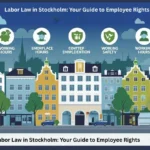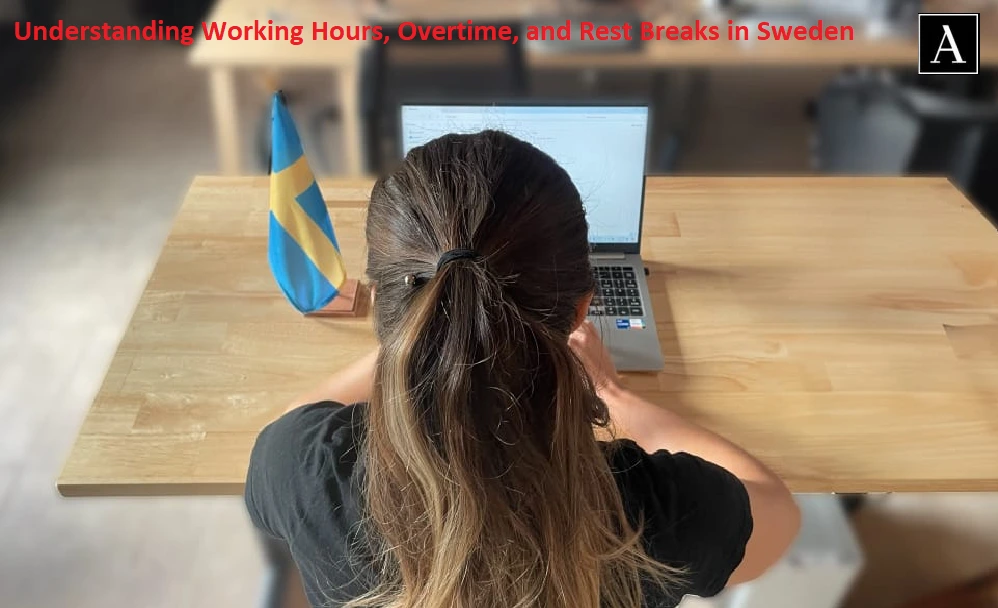Understanding Working Hours, Overtime, and Rest Breaks in Sweden
Labor law in Sweden ensures that workers experience a healthy balance between personal and work life. Employers and employees must understand that working hours, overtime, and rest breaks operate according to Swedish Labor law.
This easy-to-understand guide provides a detailed overview for HR professionals, small business owners, and employees working in Sweden.
What are the standard working hours for employees in Sweden?
The standard working hours for employees in Sweden are 40 hours/ week. The Swedish Working Hours Act (Arbetstidslagen), which provides the foundation for most labor contracts, governs this regulation. The regular working days are Monday through Friday. However, working days, hours, and timings can change according to the business and industry type.
What is ‘Overtime’ in Sweden?
In Sweden, overtime refers to any work an employee performs after carrying out their duties during the agreed-upon regular working hours.
According to the Working Hours Act in Sweden, an employee can work 200 hours at most per year. An extra 150 hours can be allowed in exceptional cases, depending on the situation.
Common Types of Overtime
- General overtime comprises the additional hours an employer requests the employee perform due to an unexpected work overload.
- Additional overtime is the extra overtime in addition to the general overtime. It is applicable in extreme circumstances.
Legal Limits of Overtime
- Maximum of 48 hours/week, inclusive of overtime
- Compensatory time off or overtime pay is required
Compensations for Overtime
Overtime compensation can take the form of monetary remuneration or paid leave. Details depend on the employee’s contract or the collective agreement between the employer and the employee.
Generally, the rates of overtime compensation are:
- 50% extra pay is given to the employee after he/ she work 2 extra hours beyond their routine working hours
- 100% extra pay for overtime done beyond 2 hours, or overtime done during holidays or weekends
- Compensatory leave instead of a cash payment is usually allowed
Daily and Weekly Rest Breaks and Requirements
Swedish law and regulations mandate that employees get minimum rest periods daily and weekly. The rest breaks safeguard employees from burnout and ensure that workers get some personal time.
The requirements of the rest break include:
- Daily rest: A minimum break of 11 consecutive hours after 24 hours.
- Weekly rest: a minimum break of 36 consecutive hours (usually includes Sunday) after 7 days
Rest During the Workday
Employees in an organization have the full right to take short breaks, including meal breaks, during their routine work hours. Although Swedish law is not defined rigidly, it demands that no employee work consistently for a long stretch of time and must take short breaks to relax.
The common break and rest practices during the workday include:
- Short breaks, also known as a snack or coffee break, of 5 to 15 minutes each. Typically, these are paid as they are taken during the workday.
- The meal break, typically known as the lunch break, lasts 30 to 60 minutes. Generally, it is unpaid.
Flexibility and Exceptions Under Collective Agreements
Collective agreements (kollektivavtal) have the power to alter the standard rules.
Employer organizations and unions can negotiate kollektivavtal in Sweden to:
- Schedule different working hours, such as 38 or 37 hours a week
- Define the calculation and/ or compensation of overtime
- Provide favorable or extra breaks and rest periods
Employers must abide by these agreements if they apply to a particular employer’s sector or business.
Part-Time or Flexible Work
Sweden is best known for promoting relaxation and creating work-life balance. Swedish labor laws are reflective of this Swedish concept. The flexible work options in Sweden include:
- Flextime, known as ‘flextid’ in Swedish, allows employees to select their start and end times according to the agreed limits.
- Remote work, which in Swedish translates to ‘distansarbete’, requires mutual consent from the employer and employee.
- Part-time work is commonly practiced, especially by employees who are also parents, and the law protects it.
Employers in Sweden are required to seriously consider employees’ requests for easier work schedules, particularly if they stem from the employee’s caregiving or health needs.
Penalties for Not Complying with the Working Time Regulations
Non-compliance with working hours and overtime regulations can result in sanctions and fines. Labor inspectors in the Swedish Work Environment Authority (Arbetsmiljoverket) supervise compliance-related matters.
Generally, the potential penalties tend to be the following:
- Fines by the employer
- Changes to the work hours
- Damages paid to the affected workers
How Can Employers Stay Compliant
Employers must comply with the regulations regarding working hours, rest breaks, and overtime in Sweden. Here are some helpful tips for doing that.
- Document every employee’s working hours. Digital systems help track breaks and working hours.
- Apply to the appropriate collective agreement, and follow it.
- Train your HR (human resources) department regularly so they stay up to date with working time, rest breaks, and overtime regulations.
- Inform every employee of their rights and responsibilities according to their designation.
- Ensure to stay fair and just with every worker.
If an employer fails to comply with the work regulations in Sweden, the employee can report him/ her and, in worst-case scenarios, resort to legal action.
How Advantage Law Firm Can Help You
Advantage Law Firm can assist you in navigating different situations related to work-time regulations.
If you are an employer, our expert advocates can assist you with drafting contracts in compliance with Swedish labor law, reviewing collective agreements, dispute resolution, advising on policies related to overtime, and legal representation if needed.
If you are an employee, our seasoned lawyers can help you review the employment contract and ensure your employer complies with the working hours, breaks, and overtime regulations as stated by Swedish law.
If you have any questions, call or fill out the form below, and our experts will get back to you shortly.
Book a Consultation
-

 Labor Laws in Sweden
Labor Laws in Sweden -

 Skillnaden mellan jurist och advokat inom fastighetsrätt
Skillnaden mellan jurist och advokat inom fastighetsrätt -

 Avskedad Med Omedelbar Verkan
Avskedad Med Omedelbar Verkan -

 Acquisitions of companies
Acquisitions of companies -

 Exploring the Framework of Real Estate Law in Sweden
Exploring the Framework of Real Estate Law in Sweden -

 Let Us Understand Swedish Immigration Law from Application to Citizenship
Let Us Understand Swedish Immigration Law from Application to Citizenship -

 Understanding Working Hours, Overtime, and Rest Breaks in Sweden
Understanding Working Hours, Overtime, and Rest Breaks in Sweden -

 Labor Law in Sweden: Important Insights on Employee Rights, Benefits and Pay
Labor Law in Sweden: Important Insights on Employee Rights, Benefits and Pay -

 Navigating Swedish Law: How to Find the Right Attorney in Sweden
Navigating Swedish Law: How to Find the Right Attorney in Sweden -

 Legal Attorney Services
Legal Attorney Services -

 Labor Law in Stockholm: Your Guide to Employee Rights
Labor Law in Stockholm: Your Guide to Employee Rights -

 Real Estate Law That Protects Your Property, Profits, and Peace of Mind
Real Estate Law That Protects Your Property, Profits, and Peace of Mind -

 Resolving Business Disputes in Stockholm: Your Guide to Expert Legal Solutions
Resolving Business Disputes in Stockholm: Your Guide to Expert Legal Solutions -

 How to Avoid Common Pitfalls for Compliance and Corporate Law in Sweden?
How to Avoid Common Pitfalls for Compliance and Corporate Law in Sweden? -

 Real Estate Attorney in Sweden: Navigating Property Laws for Buyers and Sellers
Real Estate Attorney in Sweden: Navigating Property Laws for Buyers and Sellers -

 Welcome to Advantage Law Firm
Welcome to Advantage Law Firm -

 Why Get Expert Legal Support for International Employment Disputes?
Why Get Expert Legal Support for International Employment Disputes? -

 How to Appeal a Rejected Residence Permit in Sweden
How to Appeal a Rejected Residence Permit in Sweden -

 Advantage Affärsadvokatbyrå är specialist på entreprenadrätt
Advantage Affärsadvokatbyrå är specialist på entreprenadrätt -

 Legal Consultation
Legal Consultation

